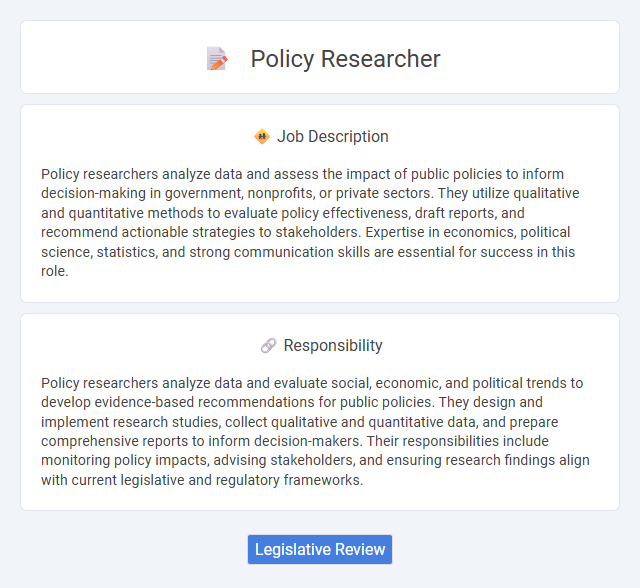
Policy researchers analyze data and assess the impact of public policies to inform decision-making in government, nonprofits, or private sectors. They utilize qualitative and quantitative methods to evaluate policy effectiveness, draft reports, and recommend actionable strategies to stakeholders. Expertise in economics, political science, statistics, and strong communication skills are essential for success in this role.
Individuals with a strong analytical mindset and a passion for social issues are likely suitable for a policy researcher role, as it requires evaluating complex data and understanding societal conditions. Those adaptable to fast-paced environments and comfortable with extensive research may have a higher probability of success. People who prefer collaborative problem-solving and can communicate findings effectively might find this career particularly fitting.
Qualification
A policy researcher typically holds at least a master's degree in public policy, political science, economics, or a related field, demonstrating strong analytical and quantitative skills. Expertise in data analysis software, experience with statistical methods, and knowledge of legislative processes are essential qualifications. Strong communication skills and the ability to synthesize complex information into actionable policy recommendations are also critical for success in this role.
Responsibility
Policy researchers analyze data and evaluate social, economic, and political trends to develop evidence-based recommendations for public policies. They design and implement research studies, collect qualitative and quantitative data, and prepare comprehensive reports to inform decision-makers. Their responsibilities include monitoring policy impacts, advising stakeholders, and ensuring research findings align with current legislative and regulatory frameworks.
Benefit
Policy researcher roles likely offer benefits such as access to extensive data resources and opportunities to influence public decision-making processes. Employment in this field probably includes intellectual challenges that foster professional growth and skill development. Competitive salaries and potential for networking within governmental and academic circles could also be expected advantages.
Challenge
Policy researcher roles likely involve navigating complex data sets and conflicting stakeholder perspectives, presenting a challenging environment for decision-making. The probability of encountering shifting political landscapes and evolving regulatory frameworks adds further difficulty to producing relevant and timely analyses. Challenges may also arise from the necessity to balance rigorous evidence-based recommendations with practical policy constraints.
Career Advancement
Policy researchers gain career advancement by specializing in key sectors such as healthcare, environment, or education, increasing their value to think tanks, government agencies, and advocacy groups. Developing expertise in data analysis, econometrics, and policy simulation tools enhances their ability to influence decision-making processes and secure senior roles like senior analyst or policy director. Networking with policymakers and contributing to influential publications further accelerates upward mobility within the public policy field.
Key Terms
Legislative Review
Policy researchers specializing in legislative review analyze proposed laws and regulations to assess potential impacts, compliance challenges, and alignment with existing policies. They provide evidence-based recommendations to lawmakers and stakeholders, ensuring that legislative frameworks promote effective governance and social equity. Mastery of legal analysis, data interpretation, and stakeholder engagement are essential skills in this role.
 kuljobs.com
kuljobs.com